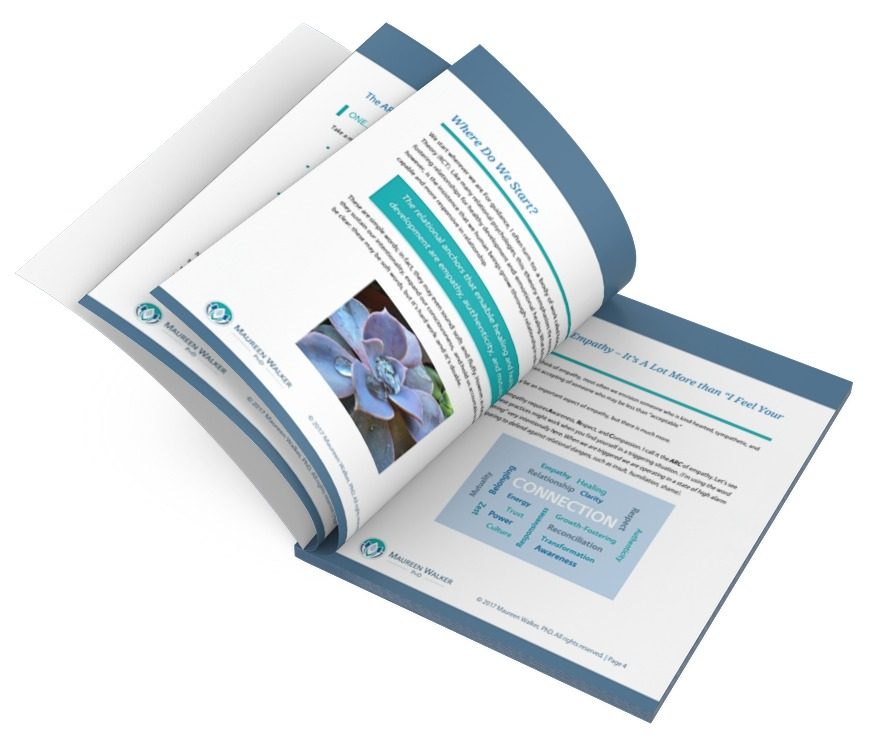Among polite circles, there seems to be an agreement that there is no such thing as a stupid question. While I remain wholly unconvinced of that notion, one thing I know for sure: There is such a thing as a useless question. How anyone of any political stripe can ask if Donald Trump is a racist is simply incomprehensible. It is simply impossible for any sentient being (and I’m assuming that he is at least sentient) to blunder into the white supremacist stances that he has promoted over his decades in the public arena. From calling for the execution of Exonerated Five to validating “good people” Neo-Nazis in Charlottesville to endorsing xenophobia by demonizing Mexicans and people from black sh*thole countries to reveling in the bigotry of his “Send her back” crowds – there simply isn’t much point in wasting ink accumulating evidence of his racialized hatred. To ask whether his racism is really real is to be distracted from how his racism really works. It has a real and deadly function, one that he mimed from a certain Herr Hitler who was also given to describing the presence of people whom he hated as an “infestation”.
To ask if the current White House occupant is racist reminds me of jokes told in the laugh-to-keep-from-crying mode of certain black comedians in the 1960’s. As the stories go, Jim Crow politicians enacted literacy tests to determine eligibility to vote. Of course, the punch line is predictable. White citizens are asked to spell words like “boy” and “go”; Black citizens are instructed to spell “chrysanthemum”. Obviously, spelling “chrysanthemum” was not the point. In fact, it might be argued that the interlocutors patrolling the polls would not have known the correct spelling if they had heard it.
In a similar vein, the comedian Paul Mooney has often made light of the cosmetic makeovers of racism. Somehow over the years, the Aunt Jemima food packaging morphed from images of a very dark-skinned, grinning, plump, red-kerchief-wearing Mammy stereotype to a pleasantly smiling, somewhat lighter-skin-toned woman who seemed to be rocking a Dark & Lovely perm. However, the bleaching of the skin and the straightening of the hair did nothing to change the function of the image; it simply served to make the stereotype more palatable. To echo a slightly cleaned-up version of the Mooney commentary: “I don’t care how straight your hair is; get in that kitchen and make me some damn pancakes!”.
The racial bigotry of the White House occupant is not new; it is in fact rather predictable and unoriginal. To over-individualize his bigotry is to continue pledging allegiance to the lie that American racism is an historical anomaly (it’s all behind us) manifest through the abhorrent actions of individual actors. Furthermore, to focus on his individual bigotry is to distract us from what Toni Morrison calls “the serious function” of racism. The serious function of racism is to rank order human worth – to create a species of sub-humans who, as Morrison puts it, have to explain the legitimacy of their existence over and over again. The serious function of racism is to establish and maintain the right to define power: what it is, who has access to it, in what form and quantity, as well as how and when it can be used. In other words, ensuring a literate citizenry was never the point of “spelling chrysanthemum”; the point was to determine who might in fact exercise the rights and powers of citizenship. The point was to establish and maintain deep structured systems of emotional and physical abuse, social and political degradation, and when those systems fail, to institutionalize annihilation. The point was to create a class of people who could justifiably be exploited (to ensure the aid and comfort of the supremacist group) and/or reviled (to protect the economic and social entitlements of the supremacist group). Perhaps most dangerously, racism functions to instill the notion that one can be “somebody” only to the extent that there exists a class of “nobodies”. It is this inverse dependency that partially explains the fear, shame, and twisted delusions that undergird all supremacist belief systems.
As a cultural tool, racism is multi-functional. Although it may appear to be an end in itself, closer analysis reveals it as a contrivance necessary to all predatory systems. Think, for example, of the now decades-long debate about who has the right to health care. Without a doubt, images of ne-er-do-wells, racialized succubae either domestic or border-crossing, invigorated opposition to the notion of health care as a universal good in a civilized society. (It is no accident that the Cadillac-driving Welfare Queen had a hyper-visible race and a gender.) Of course, there is always the inevitable collateral damage of oppressive and unjust systems: the middle-class young people of all races who die because they cannot afford insulin, or the middle-class, privately-insured white woman who is denied the drugs necessary to treat her Stage III breast cancer. Rather than name the racialized supremacist ethos at the root of a predatory healthcare system, we became distracted by silly arguments about whether President Obama (whose citizenship and qualifications remained contested for eight years) could actually build a functional website to host the exchange market. Other less obviously personalized attacks focused on the insidiousness of socialism: you know, that nefarious system of distribution that fails to distinguish between the deserving and the undeserving. Notice too, that in order to perpetuate an unjust system, it is the Presumptively Deserving who get to control the definitions and the terms of the discourse. For example, subsidized school lunches for economically distressed families is socialism; a hefty tax subsidy (in the form of non-negotiated drug prices) for Big Pharma is not. What happens when we engage the definitions as if they were legitimate? We are wasting time spelling chrysanthemum – over and over again.
So how do we stop wasting time asking useless questions and engaging disingenuous arguments? How do we break our allegiance to the presumptively obligatory lies that are branded as American patriotism? We can start by telling an uncomfortable truth. We can start by engaging the Original Paradox at the heart of the American cultural narrative. We are not, as proclaimed by our Constitution, a nation conceived in liberty and dedicated to the proposition of equality. We are a nation conceived in compromise, one of the more notable compromises being the mathematical equation to apportion the collective humanity of persons trafficked from Africa and enslaved in the colonies. Our foundational principles are grounded on a racialized fault line drawn straight through the heart of the Constitution to produce, protect, and preserve inequality. For example, naturalization acts and immigration laws through the centuries have ratified citizenship as the entitlement of white people, a political class designated to receive guaranteed rights as well as financial reparations. Believing that commitment to equality and justice is a quintessentially American virtue has led to wild contortions of logic. Were we to acknowledge the Original Paradox of the American justice narrative, we might be able to have more sensible and productive conversations about its contemporary iterations. Here is a case in point. George Washington, our first president is rightly revered for rejecting despotic power and for furthering the establishment of a democratic republic. Addressing a Hebrew congregation in Newport Rhode Island, it was he who declared that “Happily the United States gives to bigotry no sanction, to persecution no assistance.” It was also he who worried that “the idea of freedom might be too great a temptation for them [captive Africans] to resist . . . . and if they conceived they had a right to it, make them insolent to slavery.” It follows then that he would rotate his human property from Philadelphia to Richmond to circumvent the laws that emancipated slaves after six months in a free state. He also relentlessly pursued those few who were able to escape, finding it incomprehensible that anyone would dare leave such a beneficent master/owner as he considered himself to be. If this strain of contorted logic sounds familiar, it should. We only have to recall the cultural outrage at African American athletes who dared to suggest that Black Lives Matter. How dare they fail to recognize who defines the contingencies of free speech? In fact, how dare they not know that their rights are always contestable, more an indulgence granted by the master class than an entitlement of citizenship? Laura Ingraham put it bluntly to LeBron James: “Shut up and dribble”. She might as well have said: “Your job is to keep spelling chrysanthemum – over and over again”.
When we continue pledging allegiance to the lie (i.e. fail to acknowledge the Original Paradox), we are ill-prepared to explain its reverberations throughout the course of American history. On the 217th day of 2019, our nation recorded its 255th mass murder. What has this epidemic to do with the Original American Paradox? It’s frighteningly simple really. Earlier I described racism as a multi-functional tool; it is also forever generative. Although the Original Paradox was structured along racialized dimensions, it relentlessly offers up whole categories of humans – sometimes in bundles – who can be justifiably reviled. Let me give you a rather graphic example. Driving around in my “proud blue” state of Massachusetts, a few days ago I noticed a big black pickup truck in front of me. It was plastered with decals, the largest of which almost literally screamed REDNECK! (Font change intentional) Then I noticed another sticker: it was the emblem of the American flag rendered in black and white with bullets instead of stripes. Featured on the left side of the back window panel was an angry-demented image of the comic strip character Calvin, urinating on the word ISIS. On the right side of the back window panel was a giant decal with the word (Sensibility alert!) “Vaginatarian”. (Of course, my Word program is now giving me red squiggly lines because that’s not really a word.) But it is a powerful message. Our ostensibly heterosexual white male driver felt justified in proudly proclaiming his right to degrade anyone whom he thought should be inferior to him. In fact, once ensconced at the top of the hierarchy of human worth, this ostensibly heterosexual white male person needs “less deserving” people to maintain his position. Of course, there are moderating factors that make holding on to his status a little tricky. In a hyper-capitalistic culture, money matters as a measure of worth. Then there is this sneaky fact: the less capitalistic worth our ostensibly straight white man has, the heavier his burden; he carries the full weight of the bigotries that protect the interests of his same-race counterparts, regardless of social status and gender. It is who he becomes the face of the hatred and violence that the Original Paradox has prepared him to deliver. Never recognizing that he is a pawn in a predatory system, he assumes the position: blaming proudly, parading the hatreds that mark him as a “red-blooded American patriot”.

Let me be very clear: not everyone who drives a black pickup truck with offensive decals will take up arms as did 24-year-old Patrick Crusius or 21-year-old Connor Betts. Not every young white male wearing a Team Mitch t-shirt will arm himself with an assault weapon for the specific purpose of murdering his presumed inferiors – people who pose such a threat to his sense of worth and belonging that they must be annihilated. However, when these young white men pose for a photograph choke-groping a cut-out of Representative Ocasio-Cortez, we do have to ask: who raised these boys? I don’t mean in the lazy “let’s-blame-their-biological-parents” sense. After all, these boys are not the offspring of mothers and fathers who dressed them, made potato salad, and took them to Sunday lynching picnics. Yes, they do have parents. But more importantly, they are raised in an American culture that has not yet come to terms with its Original Paradox: one in which human worth is always contestable. In strict de jure terms, naturalization acts have been repealed. The same ends can be accomplished by exclusionary immigration policy, if not law. Just a few days ago, 45’s administration issued a new rule targeting legal immigrants who desire to live in the United States as permanent residents. Beginning in October, about a month and a half from now, the government’s decision of whether or not to grant permanent status to green card applicants will be based on an aggressive wealth test. This test will determine whether immigrants have the means to support themselves. The government will ‘legally’ deny green cards to poor immigrants. In other words, the government will deny permanent legal status to those who might use government benefit programs such as food stamps and subsidized housing. Immigrants who happen to be wealthier will be able to obtain a green card and accorded permanent legal status. Behind this rule, is the belief that immigrants from browner countries will be a financial drain on our country, while immigrants from European countries will not.
In other words, our nation continues to promulgate the notion of whiteness as quintessentially American. Furthermore, this notion is concretized in systems that demand obeisance to whiteness as the decisive condition of belonging. So what were those boys doing with that cut-out? Let’s tell the truth. They certainly weren’t indulging in a feminized game of “paper dolls”. They were not engaging in “free-spirited-boys-will—be-boys” horseplay. These were white boys feeling justified in mimicking, or more disturbingly, rehearsing sexualized violence against a woman of color. Did that statement sound harsh to the ears? But did it sound untrue? What purpose would have been served by my softening it?
How many times can we feign disbelief about what is happening in our country? (“OMG, can you believe what HE said/did yesterday . . . or five minutes ago?”) How much longer do we wait for a winged hero to lift us out of this moral abyss? The time for plaintive rhetoric and hand-wringing is over. Many of us are feeling overwhelmed, but we are not helpless. We must dispense with the futility of engaging false arguments, of deferring to of showing how well we can spell chrysanthemum. This is our time. We can choose to counter distracting narratives by addressing the serious functions of the underlying hatred and violence. Let me suggest three small, but significant steps we can take.
First, now is the time for us to use our words purposefully. We have to say what’s real. I know that sounds a bit obvious and predictable. After all, “speaking truth to power” is one of the more cherished themes in our national narrative. However, truth-to-power tends to set us at odds with aspects of our cherished narratives. It challenges the power of the Presumptively Deserving group to encode the language with its own self-serving definitions. As an example, let’s go back to our origin stories. How is it that the displaced or otherwise itinerant Europeans who seized already occupied land became the “settlers” in the American narrative? How is it that the people who were already on the land became the “savages”? True to the serious function of this cherished narrative, the “savages” became “civilized” through demonstrated fealty to the “settlers”. Under these terms, violence becomes acceptable, evil is excusable, and lunacy becomes normal.
As Toni Morrison suggested, what was true about the serious function of our origin narratives remains true today. In 2019, we must be able to say “concentration camp” when talking about those for-profit prisons where children are lying in filth and separated from their loved ones. We must call out the moral emptiness of a president who while supposedly comforting the victims of a mass shooting, instead uses the time to crow about the size of his crowds. Now is not the time to cling to protective timidities under the guise of “fair and balanced” reporting. There is nothing “fair and balanced” about describing ICE raids on a chicken processing plant as legitimate means of upholding the law and protecting national security. Immigrant families working in the blood and guts of a Mississippi processing floor pose no threat to national security. The serious function of misnaming the raids – of capitulating to a cherished narrative – is to perpetuate fealty to the proposition that our American well-being is best served by maintaining our superiority over other humans. It is not only a contortion of logic, it is a grievous evil to suggest that these acts of violence are proof of American patriotism. The truths that are self-evident today have their origins in that Original Paradox: that life, liberty, and the pursuit of survival (forget happiness) have never been guaranteed for “undeserving” people at the bottom of the racialized hierarchy. Indeed, those people must prove over and over again that they are members of the human family.
Second, now is the time for us to wake up and get up. I think it was Reverend William Barber who pointed out that we can be “woke” but still be in bed. I take his comment to mean that we have to put our embodied voices on the line. It can be really satisfying to click on those sad, angry, or shocked emojis each time we Facebook witness a new outrage. Those little emoji clicks help us to comfortably experience some semblance of community (to the extent any Facebook click can be trusted). They protect us from having to disturb our own peace. I’ve come to believe that the most miserable people in the world are those who desperately seek the comfort of being “liked” by everyone, so much so that they shy away from thoughtful conflict with others. We can choose to live more freely when we give up collecting “likes”. Putting our embodied voices on the line doesn’t mean we have to pick fights everywhere we go. (Sooner or later we wouldn’t get to go anywhere.) It does mean, however, that we can’t be so desperate to feel comfortable that we silence ourselves when we have truths to tell – or truths to question.
Third, we must freely gather wisdom, especially from unexpected sources. Once I was casually complaining to a former client about my difficulty lining up the finer points of logic in a presentation I was giving. She stopped me cold. “Maureen, why do you have to be so undemocratic about it? Why can’t you just put out some ideas and let people go where they will with it?” Of course, my first reaction was to resist: If I didn’t showcase my airtight logic, how else could I prove that I was right? The underlying fear was how else can I prove that I’m worth listening to. You see, over the years I became very good at spelling chrysanthemum; it was proof of my worthiness to belong. With my client’s help, I think I have learned to relax a bit. I am also learning that it is futile to accept the conventional definitions of victory. What that means for me today is that winning an impeachment proceeding may not mean that the current White House occupant would be expelled from office (though I do delight in the fantasy.) It means laying bare the truths about his malfeasance of office and his moral turpitude. It means refusing to collude with the “fair and balanced” reporting that refuses to name disgraceful scorn for humanity. When we relinquish our attachment to single-handed heroism and undisputed victory, we create more “living room” for ourselves and for each other. To echo the wisdom of my friend and colleague Professor Connie Gunderson, we find ourselves more productively participating in an eco-system, rather than building up an ego-system.

We are at a crisis point. As a nation, we can choose to evolve. We can choose to foster realization of the common good, secure in the knowledge that is called to enhance each other’s humanity. We can also choose to devolve into fascism, clinging to the illusion that personal security can only be gained by destroying the humanity of others. Toni Morrison, whose voice though stilled, will continue to speak to the ages. She challenges us to give up the charades; to reject the false promises of hierarchical worth. In Beloved, she reminded us that “definitions belong to the definers, not to the defined”. As Tracy K. Smith wrote in a beautiful tribute to her fellow laureate, Morrison points us toward the serious functions of the stories we live with questions: Who are we? What have we built and broken together? What does it mean to regard one another deeply, humbly, hopefully? And what are the consequences for our refusal to regard one another?
Toni Morrison was unwavering in her use of words to “liberate, empower, imagine, and heal”. Ms. Morrison’s wisdom is caught up by the young poet laureate, Amanda Gorman. On the evening of July 4th, Amanda Gorman graced the stage by the Charles River to declare independence from the false narratives of American greatness and exceptionalism. She offered a refreshing reminder that there is nothing to make “great again”. It is not only a false and distracting narrative; it is cruel in that it mutes the voices of those who suffer. Gorman describes America not as broken, but unfinished. We are the authors of this unfinished narrative. Now is the time for us to use our voices to do the serious work of liberation and healing. Unless and until we do so, we are wasting our time spelling chrysanthemum.




Thank you, yet again Maureen. For moving me more fully to places I/we must go.
The false narrative of our time renders us bankrupt. IF not our voices, what then?
Quoting Hillel from the Torah: “And if not now, when?… That which is hateful to you, do not do to your fellow….the rest is the explanation; go and learn.”
Thank you for continuing to teach and guide and say that which must be spoke.
TRUTH.
Karen
This piece raised big questions for how we can challenge the myths of America that all are treated equally. How we can put our embodied voices to work telling truths in ways that won’t be ignored and questioning what is falsely promoted as truth in ways that will do the serious work of liberation and healing. If we look away we are complicit. I needed to read this today. Thanks for challenging, inspiring and leading.
Love,
Roseann
So much. Difficult to digest. But the re-framing of broken to unfinished–whether your intention–helps me to feel and think as if there is hope At least sometimes I can embrace this. That said I struggle waking up and getting up. I am a white, over-educated, Protestant, heterosexual woman and I don’t know how to spell chrysanthemum ( looked back at your text to get it right.). But it doesn’t matter. It doesn’t change my place of privilege. At the same time, I am stuck feeling and thinking that there is no hope and there is nothing I can do to make a difference. No one is listening. Our sisters and brothers seem to be unwilling or unable to challenge the narrative and consequences of America’s greatness. None are listening. You can be sure they are not reading this blog.
Thank you for this important piece.
Lisa